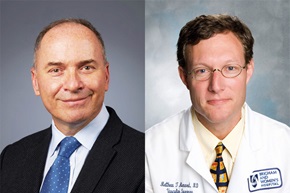
The American Heart Association (AHA) has named the BEST-CLI (Best endovascular vs. best surgical therapy in patients with critical limb ischemia) trial one of the top cardiovascular advances of 2023. This study—led by vascular surgeons Alik Farber, MD, and Matthew T. Menard, MD, and interventional cardiologist Kenneth Rosenfield, MD—compared open and endovascular treatments for chronic limb-threatening ischemia (CLTI) and was aimed at exploring the effectiveness of each treatment modality.
“First and foremost, it brought surgery back into the discussion of CLTI care against a backdrop of a progressive decline in the use of surgical bypass and a dramatic escalation of the use of endovascular therapy,” commented Menard.
“Given the primary finding that surgery was more effective at preventing the main endpoint of major adverse limb events [MALE] or death, it was a wakeup call of sorts to the vascular surgical world in terms of the ongoing importance of surgery as a treatment option.”
Menard, from Brigham and Women’s Hospital, and his counterpart Farber, at Boston Medical Center, both in Boston, brought together their expertise in vascular and endovascular surgery to embark on a journey that spanned well over a decade. The duo initiated the idea for the BEST-CLI trial in 2007, during a break at the New England Society for Vascular Surgery annual meeting that year, recognizing the need to address the uncertainty surrounding the optimal treatment for CLTI patients. Rosenfield, from Massachusetts General Hospital, joined before the trial was approved and provided an interventionalist perspective to the project.
Farber said that neither he nor Menard had experience conducting clinical trials when they first conceptualized the idea. However, reaching out to the Society for Vascular Surgery (SVS) leadership proved crucial in securing the necessary support to turn their vision into reality.
The trial began enrolling patients in 2014 and concluded in 2019, though it encountered numerous challenges and roadblocks. Despite the complexities involved, Rosenfield acknowledged the enthusiasm within the medical community to answer the question of the optimal treatment for CLTI. To pursue the trial and provide impetus over the ensuing decade, the investigators confirmed the high degree of equipoise associated with the two standard-of-care open surgery and endovascular treatment strategies through a survey conducted early in the process. Involving over a thousand investigators across 150 sites worldwide, the trial required a substantial commitment to complete.
“The SVS has been critical, from the first outreach we undertook in 2009 to the support provided by every one of the SVS presidents since that time. They not only formally endorsed the trial,” said Farber, “they played a key role in our successful fundraising effort towards the end of the trial. They also helped us throughout the process by allowing us to showcase the trial in publications such as Vascular Specialist, within Society-sponsored webinars and at the SVS annual national meetings.”
The trial’s secondary findings, unveiled at the 2023 Vascular Annual Meeting (June 14–17) in National Harbor, Maryland, revealed that both open and endovascular procedures were equally safe for CLTI patients, and that, notably, the major adverse cardiovascular event (MACE) and mortality rates were similar between the two study arms. Farber stressed the study’s broader implications, noting its impact on raising awareness and interest in CLTI care, and in reinforcing a focus on CLTI globally, especially in the context of the increasing prevalence of diabetes.
“It’s the patient that suffers the most when we, as a community of physicians and caregivers, are unclear about best practices,” added Farber.
“We owe an incredible amount of gratitude both to the patients who were brave enough and generous enough to allow us to investigate this clinical problem through their experience, and to all the investigators, including many SVS members, who worked so hard to see the trial through to completion. The benefits of BEST will continue to be paid forward, as the wealth of generated data will serve as a foundation on which we as a community can base future efforts to better understand the numerous unanswered questions that remain in CLTI care.”












